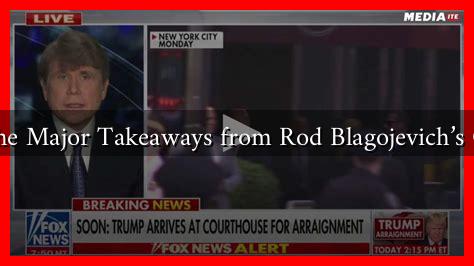-
Table of Contents
What Are the Major Takeaways from Rod Blagojevich’s Conviction?
Rod Blagojevich, the former Governor of Illinois, was convicted in 2011 on multiple counts of corruption, including attempting to sell Barack Obama’s vacant Senate seat. His case has become a significant point of discussion regarding political ethics, the legal system, and the implications of corruption in public office. This article explores the major takeaways from Blagojevich’s conviction, shedding light on the broader implications for governance and public trust.
The Nature of Political Corruption
Blagojevich’s case exemplifies the complexities of political corruption. His actions were not merely about personal gain; they highlighted systemic issues within political structures. The following points illustrate the nature of corruption as seen in this case:
- Abuse of Power: Blagojevich’s attempts to leverage his position for personal gain underscore the potential for abuse inherent in political office.
- Public Trust Erosion: His actions contributed to a significant erosion of public trust in government institutions, a sentiment echoed in various polls conducted post-conviction.
- Legal Precedents: The case set important legal precedents regarding the interpretation of corruption laws, particularly concerning the boundaries of political negotiation.
The Role of Media and Public Perception
The media played a crucial role in shaping public perception of Blagojevich’s actions.
. His flamboyant personality and the sensational nature of the allegations drew significant media attention, which had both positive and negative effects:
- Media Scrutiny: The extensive coverage of Blagojevich’s trial highlighted the importance of media in holding public officials accountable.
- Public Outrage: The media’s portrayal of Blagojevich as a corrupt politician fueled public outrage, leading to calls for reform in Illinois politics.
- Reality TV Persona: Blagojevich’s appearances on reality television post-conviction further complicated his public image, blurring the lines between entertainment and serious political discourse.
Implications for Political Reform
Blagojevich’s conviction has sparked discussions about the need for political reform in Illinois and beyond. Several key implications arise from this case:
- Stricter Regulations: There is a growing consensus on the need for stricter regulations regarding campaign financing and lobbying to prevent similar abuses of power.
- Transparency Initiatives: The case has led to calls for increased transparency in government dealings, including the establishment of watchdog organizations to monitor political activities.
- Voter Engagement: Blagojevich’s actions have highlighted the importance of voter engagement and education, empowering citizens to hold their elected officials accountable.
Lessons for Future Leaders
For current and future political leaders, Blagojevich’s conviction serves as a cautionary tale. The following lessons can be drawn:
- Integrity Matters: Upholding ethical standards is crucial for maintaining public trust and credibility.
- Accountability is Key: Leaders must be held accountable for their actions, reinforcing the idea that no one is above the law.
- Engagement with Constituents: Regular communication and engagement with constituents can help leaders stay grounded and aware of public sentiment.
Conclusion
Rod Blagojevich’s conviction serves as a stark reminder of the potential for corruption in political office and the far-reaching consequences it can have on public trust and governance. The case underscores the need for systemic reforms, greater transparency, and accountability in politics. As society continues to grapple with issues of corruption, the lessons learned from Blagojevich’s actions remain relevant, urging current and future leaders to prioritize integrity and ethical governance. For more insights on political corruption and reform, you can visit Brookings Institution.





